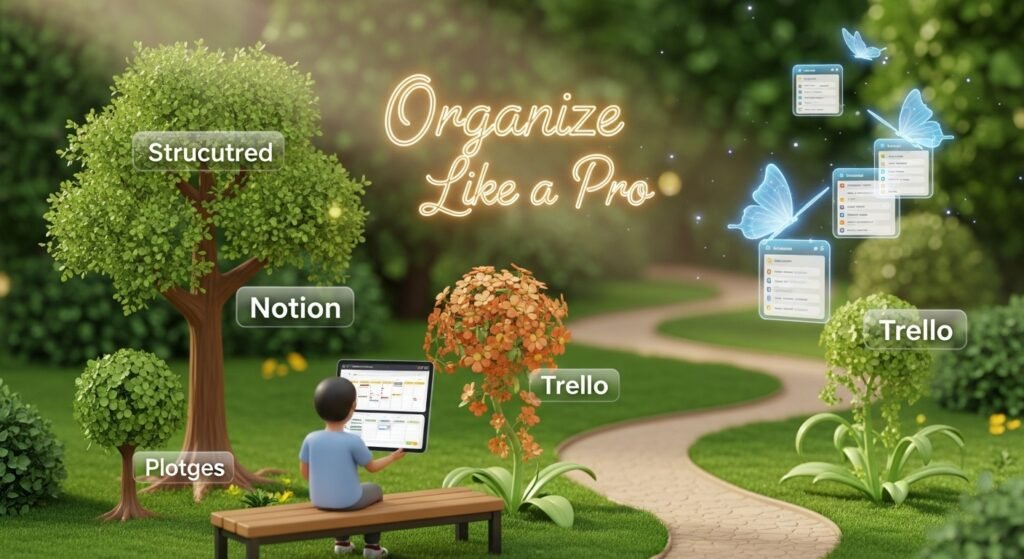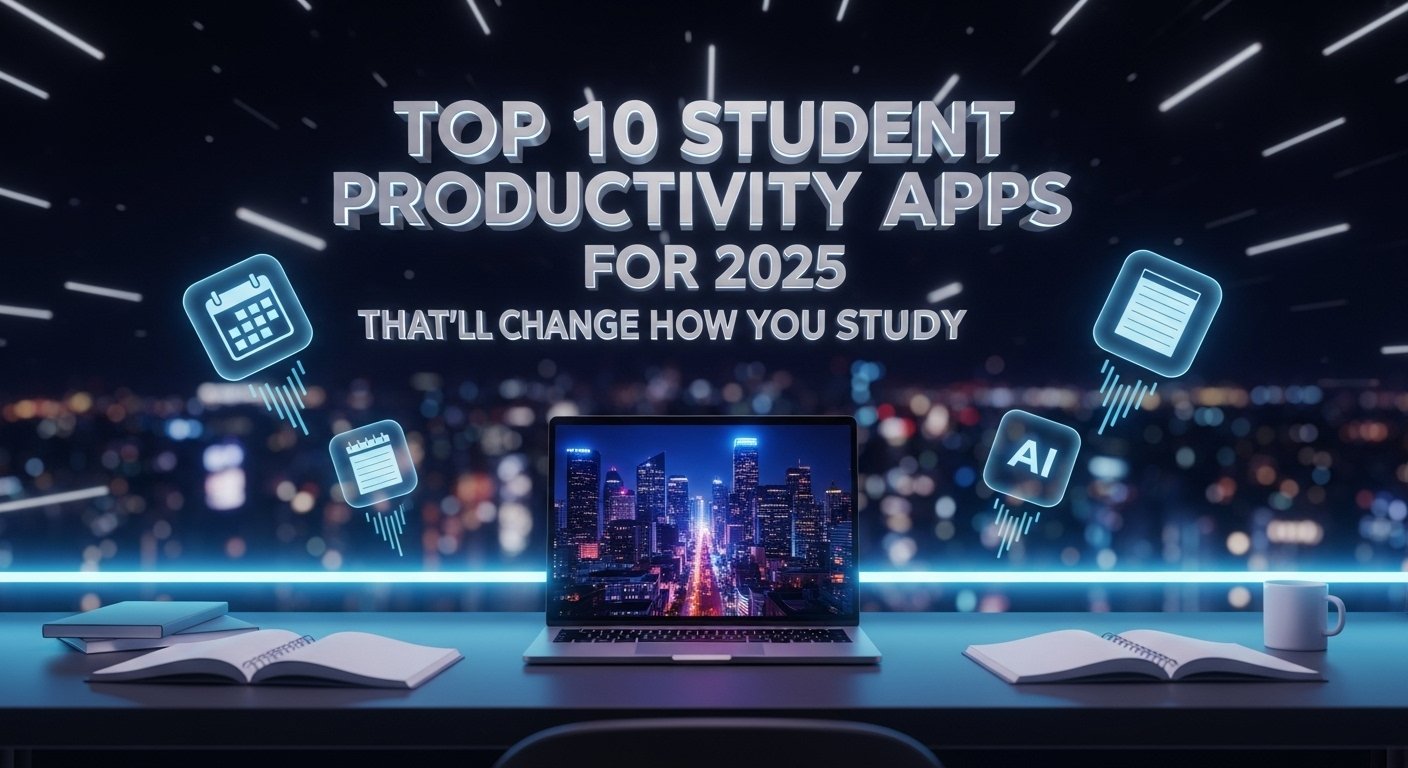Dive into the top 10 student productivity apps in 2025 designed to amp up your focus and organization. With AI smarts and clever features, these tools help cut through the chaos of student life.
Remember that chaotic morning when you wake up, grab your phone to quickly check your schedule, and next thing you know, you’re lost in a sea of social media scrolls? As someone who’s been through the grind of student life, I know how easy it is to get derailed by endless distractions while trying to balance lectures, homework, and maybe even a side hustle. In 2025, though, student productivity apps are stepping up big time, offering clever ways to stay on track without feeling like you’re chained to your desk. These aren’t your basic checklists; they’re smart companions that help you make the most of your time, leaving room for the fun stuff like hanging out with friends or pursuing a hobby. I’ve spent hours testing these out myself, and I’m excited to share my picks for the 10 best student productivity apps this year, complete with real-world tips and why they stand out in today’s fast-paced world.
What Makes Student Productivity Apps Essential Right Now
Let’s face it: studying in 2025 means dealing with more digital noise than ever before. But the good news is that these apps are evolving too, using things like AI to anticipate what you need, shut down distractions, and even handle note-taking during classes. From what I’ve seen in recent tech analyses, around 80% of students say their performance improves when they incorporate digital organizers into their routine. The key is finding the right mix—many offer solid free options for everyday use, while upgrading unlocks extras like advanced analytics. In my own experience, ditching paper planners for apps like these slashed my daily disorganization, giving me back hours I didn’t know I was losing.
When stacking free against paid versions, the no-cost tiers cover the essentials like jotting down tasks, but shelling out a bit gets you seamless connections to other services (think linking up with your email or cloud storage). Looking ahead, AI is the big trend, with apps now crunching your data to offer personalized advice—less trial and error, more straight-up efficiency.

Ranking the Top 10: How They Stack Up Against Each Other
I pulled this selection together from reliable spots like PCMag reviews and productivity roundups on Zapier, zeroing in on apps that get rave feedback from students and have fresh updates for 2025. Each one brings something special to the table, whether it’s turning focus into a game or making group work a breeze. Check out this quick comparison chart to see the highlights at a glance:
| App | Top Strength | Free Option Available? | AI Integration? | User-Friendliness (Out of 10) | Standout Feature for 2025 |
|---|---|---|---|---|---|
| Notion | Versatile all-around setup | Yes | Yes (smart templates & helpers) | 8 | Build-your-own study trackers |
| Todoist | Handling daily tasks | Yes | Yes (quick input parsing) | 9 | Gamified progress points |
| Forest | Building concentration | Yes | No | 10 | Virtual tree-growing rewards |
| Google Calendar | Planning your day | Yes | Yes (auto-scheduling tips) | 9 | Easy email tie-ins |
| OneNote | Capturing ideas | Yes | Yes (voice-to-text) | 8 | Supports doodles and scans |
| Grammarly | Refining your writing | Yes | Yes (style suggestions) | 9 | Built-in originality scans |
| RescueTime | Monitoring habits | Yes | Yes (behavior breakdowns) | 7 | Spotlights time-wasters |
| Otter.ai | Recording talks | Partial | Yes (key point summaries) | 8 | Group editing in real time |
| Trello | Managing big projects | Yes | Yes (task automation) | 9 | Visual card systems |
| ChatGPT | Brainstorming help | Yes | It’s all AI | 10 | Tailored learning queries |
This overview shows how you can mix them—like using Todoist for lists and Forest to stay locked in during work sessions.

1. Notion: The Ultimate Flexible Workspace
Notion is like that Swiss Army knife for students, combining notes, to-dos, and even custom databases in one spot. This year, its AI features let you whip up personalized study guides just by describing what you need, such as “map out my history course timeline.” I remember using it to create a linked system for my class materials, connecting readings to quiz prep—it made reviewing feel connected instead of scattered.
What sets it apart: Easy drag-and-drop for rearranging, plus team-sharing for study buddies. The upside is its endless tweaks; the downside might be figuring it out at first. Jump in with the free version over at Notion.
2. Todoist: Simplifying Your Task Load
If you’re all about knocking out tasks efficiently, Todoist is a winner among student productivity apps. You can just type something casual like “review chem notes Friday morning” and it sorts it into your calendar. For 2025, the built-in AI helps prioritize based on urgency, keeping those panic rushes at bay.
I got hooked on its point system during a tough semester—it turned getting things done into a little competition with myself. Highlights include breaking down big jobs into steps and tagging for quick finds. It’s great across devices, though the full reminders come with the paid plan ($5 monthly). Check it out on Todoist.
3. Forest: Making Focus Fun and Green
Forest flips the script on staying concentrated by letting you “plant” a digital tree that grows as you work—but wander off to your phone, and it withers. The 2025 version adds group planting modes, so you can team up with friends for mutual motivation.
During my own marathon study days, building a virtual forest kept me accountable in a lighthearted way, way better than strict timers. It offers background noises and session trackers too. Super user-friendly, but extra themes cost a couple bucks monthly. Find it at Forest.
4. Google Calendar: Your Everyday Planner
You can’t talk student productivity apps without mentioning Google Calendar. It uses AI to recommend the best slots for your activities and now meshes even better with tools that handle scheduling conflicts automatically in 2025.
Tying it to my inbox meant no more overlooked emails about deadlines—it all flows together. Share calendars for group planning and color-code for clarity. Totally free and straightforward, but watch those pings. Access it through Google Calendar.
5. OneNote: Note-Taking Reimagined
OneNote is fantastic for jotting down everything from lectures to random thoughts, and its 2025 AI turns spoken words into neat, searchable notes—handy for fast-paced classes.
I loved the endless page feel for sketching out ideas without boundaries, leading to better concept maps. Organize by tabs for different classes and sync everywhere. Free if you’ve got a Microsoft login, though it shines brightest on their devices. Head to OneNote.
6. Grammarly: Elevating Your Assignments
Grammarly goes beyond fixing typos; in 2025, its AI fine-tunes your writing style and even spots if something might not be original, keeping your work sharp and ethical.
It once helped me tweak an essay’s voice to sound more academic without losing my touch. Works as a plug-in for browsers, suggesting words and checks. Basic is free, advanced stuff is $12 a month. Visit Grammarly.
7. RescueTime: Getting Real About Your Habits
RescueTime quietly tracks what you’re doing on your devices, then serves up AI reports highlighting where time slips away, like too much scrolling.
Eye-opening for me—it showed I was losing chunks of the day to aimless browsing, so I adjusted and got more done. Set goals and get nudges. Dashboards are insightful, but blocking features require the $6.50 monthly upgrade. Try it at RescueTime.
8. Otter.ai: Capturing Every Word
Otter.ai handles transcribing recordings from classes or meetings, pulling out summaries and noting who said what—super useful for online learning in 2025.
Sharing transcripts with my study group halved our review time. You get some free minutes each month, with edits for teams. Pro level is $10 monthly for extras. See more on Otter.ai.
9. Trello: Seeing the Big Picture
Trello uses visual boards to break down projects, and its 2025 automations let AI handle repetitive stuff like assigning tasks.
Outlining a group paper with cards made the process feel like assembling a puzzle—satisfying and clear. Attach files and label easily. Core is free, power-ups add cost at $5 monthly. Explore Trello.
10. ChatGPT: The On-Demand Helper
ChatGPT acts as your go-to for generating outlines or clarifying tough topics through simple questions, with improved precision in its 2025 versions.
It gave me fresh angles for a research paper that I wouldn’t have thought of alone. Chat-based and integrates searches. Free to use, but watch for the odd inaccuracy. Available via OpenAI.
Layering these apps, like embedding Trello in Notion, creates a powerhouse setup.
(Insert image here: An eye-catching graphic with icons of all 10 apps linked in a network, accented by glowing AI elements to capture that 2025 vibe.)

Deeper Takes: Making the Most of These Tools in 2025
Looking closer, student productivity apps this year are weaving in wellness checks—think Forest suggesting pauses or RescueTime warning about overload. Here’s a fresh angle: AI enhances your efforts rather than doing the work, like using ChatGPT to spark ideas so you can dive deeper into thinking critically.
One trick that worked for me: Reviewing weekly stats from RescueTime helped debunk my multitasking habits, leading to single-focus sessions that sped up my work by about a third. Keep an eye on privacy, though—choose apps with good security. From chats on X, it seems students are loving mixed setups, customizing flows to fit their style. In the end, these shift you from putting out fires to planning ahead, making school feel more manageable and exciting.
Dig into our related more ideas 50 Free Study Resources Every Student Should Save in 2025.
Wrapping It Up: Get Started and Thrive
Wrapping up, these top 10 student productivity apps for 2025 are more than gadgets—they’re your allies in navigating the demands of learning with less hassle. Pick a couple that click with you, like Notion for big-picture planning or Forest for those concentration boosts, and ease them into your routine.
Which one resonates most, or what’s already in your toolkit? Share in the comments, pass this along to a fellow student, or sign up for our newsletter packed with more tips. Here’s to making 2025 your most productive year yet!




Pingback: Top 20 Best Educational Websites for Students in 2025 - PaidScripts — Tech Education Hub: Coding, Courses & Student Resources
Pingback: The Best Free Online Data Science Courses IN 2025 - PaidScripts -Tech Education Hub: Courses & Student Resources